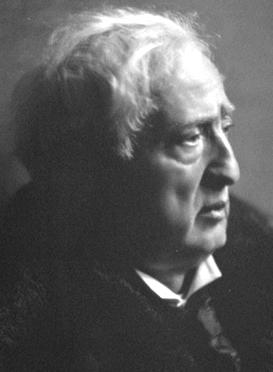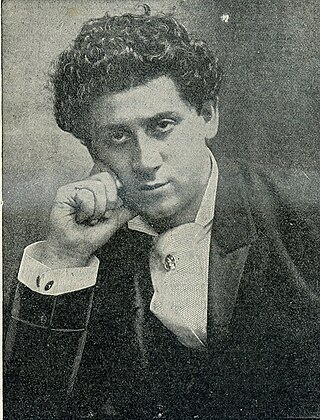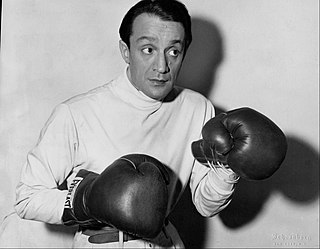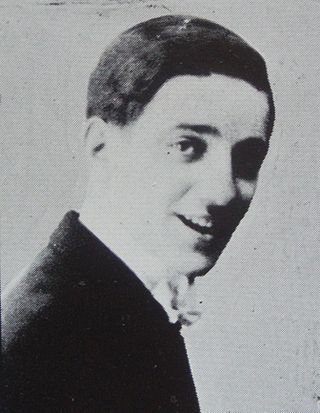Related Research Articles

Paul Muni was an American stage and film actor from Chicago. He started his acting career in the Yiddish theater and during the 1930s, he was considered one of the most prestigious actors at the Warner Bros. studio and was given the rare privilege of choosing his own parts.
Yiddish theatre consists of plays written and performed primarily by Jews in Yiddish, the language of the Central European Ashkenazi Jewish community. The range of Yiddish theatre is broad: operetta, musical comedy, and satiric or nostalgic revues; melodrama; naturalist drama; expressionist and modernist plays. At its height, its geographical scope was comparably broad: from the late 19th century until just before World War II, professional Yiddish theatre could be found throughout the heavily Jewish areas of Eastern and East Central Europe, but also in Berlin, London, Paris, Buenos Aires and New York City.

Jacob Pavlovich Adler was a Jewish actor and star of Yiddish theater, first in Odessa, and later in London and in New York City's Yiddish Theater District.

Boris Thomashefsky, born Boruch-Aharon Thomashefsky, was a Ukrainian-born Jewish singer and actor who became one of the biggest stars in Yiddish theater.

Philip "Fyvush" Finkel was an American actor and director known as a star of Yiddish theater and for his role as lawyer Douglas Wambaugh on the television series Picket Fences, for which he earned an Emmy Award for Outstanding Supporting Actor in a Drama Series in 1994. He is also known for his portrayal of Harvey Lipschultz, a crotchety history teacher, on the television series Boston Public.

Celia Feinman Adler was an American actress, known as the "First Lady of the Yiddish Theatre".

Ludwig Satz was an actor in Yiddish theater and film, best known for his comic roles. A 1925 New York Times article singles him out as the greatest Yiddish comic actor of the time.
Yetta Zwerling Silverman was a Yiddish movie star during the 1930s and 1940s.
Jerry Adler is an American theatre director, producer, and film and television actor. He is perhaps best known for his films Manhattan Murder Mystery, The Public Eye, In Her Shoes, and Prime, and for his television work as Herman "Hesh" Rabkin on The Sopranos, Howard Lyman on The Good Wife and The Good Fight, building maintenance man Mr. Wicker on Mad About You, Bob Saget's father Sam Stewart on Raising Dad, Fire Chief Sidney Feinberg on Rescue Me, Moshe Pfefferman on Transparent, Saul Horowitz on Broad City, and Hillston on Living with Yourself with Paul Rudd.

Leo Fuchs was a Polish-born American actor. According to YIVO, he was born Avrum Leib Fuchs in Warsaw; according to Joel Schechter, he was born in Lwów, Galicia, then Poland, now called Lviv, Ukraine.

Maurice Schwartz, born Avram Moishe Schwartz, born in the Volhynia province of the Russian Empire, was a stage and film actor active in the United States. He founded the Yiddish Art Theatre and its associated school in 1918 in New York City and was its theatrical producer and director. He also worked in Hollywood, mostly as an actor in silent films but also as a film director, producer, and screenwriter.

Mount Hebron is a Jewish cemetery located in Flushing, Queens, New York, United States. It was founded in 1903 as the Jewish section of Cedar Grove Cemetery, and occupies the vast majority of the grounds at Cedar Grove. The cemetery is on the former Spring Hill estate of colonial governor Cadwallader Colden. Mount Hebron is arranged in blocks, which are then split up into sections or society grounds. Sections were originally sold mainly to families or Jewish community groups such as landsmanshaftn, mutual aid societies, and burial societies. For instance, Mount Hebron is known for having a section reserved for people who worked in New York City's Yiddish theater industry. While this type of organization is common for American Jewish cemeteries, Mount Hebron has an especially diverse range of society grounds. About 226,000 people have been buried in Mount Hebron since it opened.
Seymour Rexite, originally Shayele Rechtzeit, was a Polish American singer and actor. He was a significant figure in Yiddish theatre in the United States, and with his wife Miriam Kressyn he performed on the radio over four decades, performing pop standards in Yiddish. He also served as president of the Hebrew Actors' Union.

Bruce Adler was an American Broadway actor. After debuting on the Broadway stage in the 1979 revival of Oklahoma!, he went on to a career that saw him nominated for Tony Awards as Best Featured Actor in a Musical for Those Were the Days (1991) and Crazy For You (1992). His film work was limited to voice work in animated films, notably providing the singing voice for the peddler of the 1992 Disney film Aladdin and the 1996 sequel Aladdin and the King of Thieves.
Miriam Kressyn, one of the "First Ladies of the Yiddish Theater", acted and sang on stage, film and radio; she wrote plays as well.

Hymie Jacobson, also known as Hy Jacobson (1895–1952), was an American actor and composer in Yiddish vaudeville, films and theater. Born 1895 in Chicago to actors Joseph and Bessie Jacobson. His sister, Henrietta, married Yiddish theatre actor Julius Adler; his brother, Irving, was also a performer. He and Irving also owned some of the key venues for Yiddish theater in New York City. He played child roles from the age of 4 in Cincinnati. His first adult role was at the Arch Street Theatre in Philadelphia (1917) as the comic in Panie Romani. In 1918 he played in the Peoples Theater and the following year was buff-comic at the Second Avenue Theater in the Yiddish Theater District. In 1921 he played at Boris Thomashevsky's National Theater, in 1927 at the Public Theater, then in Boston and Chicago.

Julius Adler was a Jewish-American actor, writer, and director in Yiddish theater.

The Yiddish Theatre District, also called the Jewish Rialto and the Yiddish Realto, was the center of New York City's Yiddish theatre scene in the early 20th century. It was located primarily on Second Avenue, though it extended to Avenue B, between Houston Street and East 14th Street in the East Village in Manhattan. The District hosted performances in Yiddish of Jewish, Shakespearean, classic, and original plays, comedies, operettas, and dramas, as well as vaudeville, burlesque, and musical shows.
Cafe Crown is a three-act play by Hy Kraft that premiered on Broadway on January 23, 1942, at the Cort Theatre. The cast included Sam Jaffe and Morris Carnovsky. Its action presented "a motley group of amiable squatters found in a Second Avenue restaurant ... members of the Yiddish theatre", 21 characters in all. Elia Kazan directed and Boris Aronson designed the set. Brooks Atkinson, writing in The New York Times, called it a "hospitable comedy", "simple but warm-hearted", set in the cafe where:
Every one knows every one else. Business is conducted with tremendous outbursts of temperament. No one has any secrets and no one stands on ceremony. They are not exactly one happy family, but they are clannish, emotional, self-contained, cultivated, and loyal to Second Avenue.
Joseph Seiden was a pioneering American Yiddish language film producer of the early twentieth century. He released a large number of low-budget, sentimental Yiddish dramas during the 1930s and 1940s. He also directed Paradise in Harlem, a 1940 musical film with an African American cast.
References
- 1 2 3 "Jacobson Irving". nyjewishimprints.info. Retrieved 2022-08-19.
- ↑ Weber, Bruce (2008-07-28). "Bruce Adler, Actor With Yiddish Roots, Is Dead at 63". The New York Times. ISSN 0362-4331 . Retrieved 2022-08-19.
- ↑ http://2ndave.nyu.edu/bitstream/handle/123456789/13813/38.html;jsessionid=13814600AA9BA03F5C6EDB1A5A4EAE05?sequence=1 2nd Avenue Archive
- ↑ The Morning Call The Morning Call article
- ↑ Alan Gevinson, American Film Institute catalog, p. 410
- ↑ "Yiddish Theater Walk of Fame on 2nd Avenue". Famous Ankles. 2008-02-20. Retrieved 2022-08-19.